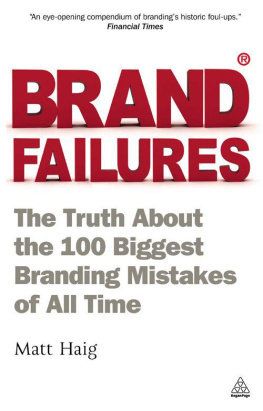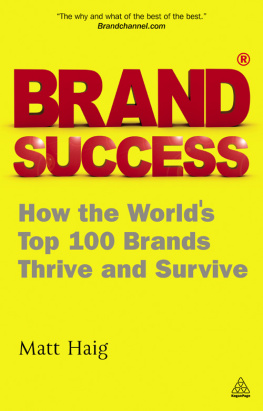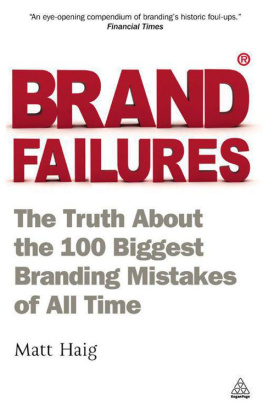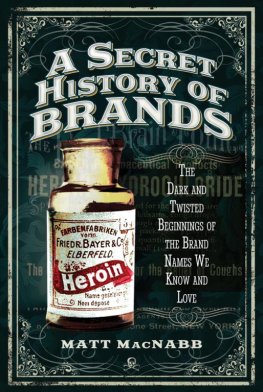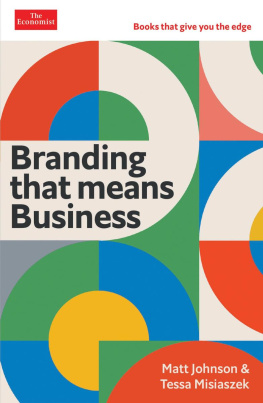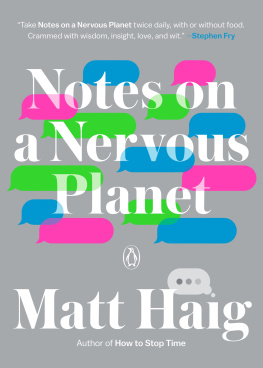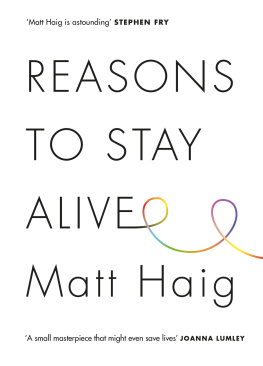Praise for
Brand Failures...
You learn more from failure than you can from success. Matt Haigs new book is a goldmine of helpful how-not-to advice, which you ignore at your own peril. Laura Ries, President, Ries & Ries, marketing strategists, and bestselling co-author of The Fall of Advertising and the Rise of PR and The 22 Immutable Laws of Branding
Every marketer will read this with both pleasure and profit. But the lessons are deadly serious, back to basics: real consumer benefits, value, execution. Read it, enjoy it, learn from it. Patrick Barwise, Professor of Management and Marketing, London Business School
Business books that manage to grab your attention, entertain you, and provide you with great advice, all at the same time, should be read immediately. This is one of those books. If you want to avoid being in the next edition of this book, you had better read it. Peter Cheverton, CEO, Insight Marketing & People, and author of Key Marketing Skills
I thought the book was terrific. Brings together the business lessons from all the infamous brand disasters from the Ford Edsel and New Coke to todays Andersen and Enron. A must-buy for marketers. Peter Doyle, Professor of Marketing & Strategic Management, Warwick Business School, University of Warwick
Brand Failures is a treasure trove of information and insights. Ill be consulting it regularly! Sicco van Gelder, CEO, Brand-Meta consultancy, and author of Global Brand Strategy
Matt Haig is to be congratulated on compiling a comprehensive and compelling collection of 100 cases of failures attributable to misunderstanding or misapplication of brand strategy. Mark and learn. Michael J Baker, Emeritus Professor of Marketing, University of Strathclyde, President, Academy of Marketing
The history of consumer marketing is littered with failed brands and we can learn from them. If you are responsible for your brand read this book. It might just be the best investment that you will ever make! Shaun Smith, Senior Vice President of Forum, a division of FT Knowledge, and author of Uncommon Practice
Books that describe best branding practice abound and yet the real learning lies in studying why brands have failed. Matt Haig has done a terrific job in analysing this topic, and I highly recommend his book to everyone responsible for brand creation, development and management. Dr Paul Temporal, Brand Strategy Consultant, Singapore ( www.brandingasia.com ) and author of Advanced Brand Management
Illuminating and amusing. The Business
Brand Failures is an entertaining and useful read. Financial Times
Makes entertaining reading, but its message is serious and provides a valuable checklist of lessons learned. Marketing
A lively, engaging book full of what not to do lessons. Marketing Business
After reading this you should be able to spot a potential brand disaster a mile off. Internet Works
Brand
Failures
The truth about
the 100 biggest
branding mistakes
of all time
MATT HAIG

Note on the Ebook Edition
For an optimal reading experience, please view large
tables and figures in landscape mode. |
This ebook published in 2011 by
Kogan Page Limited
120 Pentonville Road
London N1 9JN
UK
www.koganpage.com
Matt Haig, 2003, 2011
E-ISBN 9780749463007
Contents
B rands fail. That is their destiny. Right now, somewhere in the world, someone in a very smart suit and an expensive haircut is in a boardroom selling an idea for a new brand and everyone in the room is nodding their heads as happily as people boarded the Titanic.
Wow, Tom, a talking waste disposal unit, thats absolutely genius!
Even if it was a good idea, that brand has never had more chance of failure than it does now. It will probably go the way of smokeless cigarettes and baby food for grown-ups to that marketing graveyard in the sky. To understand how brands fail is to know where the hidden trapdoors are on the path to success.
Of course, brands come unstuck for all kinds of reasons. When Scandinavian vacuum manufacturer Electrolux launched in America, it chose for its slogan Nothing sucks like an Electrolux. Its not exactly surprising that Electrolux hasnt fared too well in that market. Today, judged by number of employees, Eastern Europe is a bigger market for the company than the US. In Europe as a whole the company employs three times as many staff as in America. Likewise, when General Motors launched the Chevy Nova in South America, it took a while for them to figure out why it wasnt selling any cars. Then it dawned on them.
Er, Marjorie, you better look at this.
What is it, Scott?
Well, you know that amazing brand name I came up with. Nova. Well, it turns out that to the Spanish speaking world it means it wont go.
So youve just written it wont go on the back of fifty million cars?
Erm, yeah.
And you didnt think to check that out on Babelfish or something?
Babelfish hasnt been invented yet, Marjorie.
Well, you know, there are such things as Spanish dictionaries.
I know that. Do you think I dont know that?!
Calm down, Scott. Come on, it will be okay. Have a drink. Ive got a can of New Coke if you want it.
Oh Marjorie, what have I done?
Rebranded as Caribe the brand formerly known as Nova actually had an okay future. Better than Edsel, Fords car-tastrophe that lost the company $2 billion in todays money when they got everything wrong from the name outwards.
When Brand Failures was first published, I had no idea how well it would be received. You see, in that respect, writing a book is very much like launching a brand. You can estimate its potential success, but you cant know for certain how well it will do until it is out there on the shelves. As it turned out, it became the most popular business book Id written. It didnt knock Harry Potter or The Da Vinci Code off the top spot, but it did okay. Why? Havent got a clue. Well, alright, I have one clue: failure. People like to hear about it its as simple as that. And nowhere is that more true than in the business world.
Nowhere has this capacity to gloat been more in evidence than the fall from grace in 2010 of two of the worlds most successful brands, BP and Toyota. Both brands suffered catastrophic, though perhaps not terminal, blows to their reputations for quality, integrity and honesty. While BP successfully played corporate baddie, leaking oil in the Gulf of Mexico, Toyota and its near invisible chairman Akio Toyoda, also found themselves at the centre of a storm of unwelcome public visibility when the company had to recall a few million cars for a variety of reasons ranging from sticking accelerator pedals to steering lock defects. Both problems had initial physical causes but were made much, much worse by complacency and bad handling.
YouGov, best-known for its political and social polling, runs Brand Index ( www.brandindex.com/content/default.asp ), a daily measure of public perception of 850 consumer brands across 34 sectors, measured on a 7-point profile. The chart of how the BP, Toyota and Goldman Sachs brands were performing over the five years to August 2010 makes for interesting viewing, but fasten your seat belt before opening this web link! ( www.nytimes.com/imagepages/2010/08/22/
business/22metrics.html?ref=business )
Interest in failure isnt because business people are all cold- hearted Machiavellians, ready to sneer down their cigars at the spectacular imbecility and incompetence inherent in a lot of failed brands. Or at least, its not just because of that. Its chiefly because failure is the reality that faces most brand managers for much of their working life.

